Nonlinear Functions and Set Theory -> experiments
Experiments Study Guide
What is an Experiment?
An experiment is a scientific procedure undertaken to make a discovery, test a hypothesis, or demonstrate a known fact. It involves performing a series of steps in a systematic way to gather data and draw conclusions.
Key Components of an Experiment
- Hypothesis: A proposed explanation for a phenomenon. It is the starting point for an experiment.
- Variables: Factors that can change or be changed in an experiment. The independent variable is manipulated by the experimenter, while the dependent variable is the outcome being measured.
- Controlled Conditions: Factors that are kept constant to ensure a fair test.
- Experimental Group: The group in an experiment that receives the treatment or is exposed to the variable being tested.
- Control Group: The group that does not receive the treatment or is not exposed to the variable being tested. It serves as a comparison for the experimental group.
- Data Collection: The process of gathering information and measurements during the experiment.
- Analysis and Conclusion: The interpretation of the data collected and the determination of whether the hypothesis is supported or rejected.
Types of Experiments
Experiments can be classified into various types based on their design and purpose:
- Laboratory Experiments: Conducted in a controlled environment, typically a laboratory, where conditions can be precisely manipulated and controlled.
- Field Experiments: Carried out in real-world settings, allowing researchers to observe natural behavior and interactions.
- Quasi-Experiments: Similar to true experiments but lack random assignment to experimental and control groups due to practical or ethical constraints.
- Blind Experiments: Participants are unaware of certain details of the experiment, such as the treatment they are receiving, to reduce bias in the results.
- Double-Blind Experiments: Both participants and researchers are unaware of critical information, such as who is receiving the treatment, to minimize bias.
Key Concepts to Understand
When studying experiments, it's important to grasp the following key concepts:
- Experimental Design:
- The structure and strategy of the experiment, including the selection of variables, the design of the experimental and control groups, and the methods for data collection and analysis.
- Validity and Reliability:
- The extent to which an experiment measures what it intends to measure (validity) and produces consistent results when repeated (reliability).
- Ethical Considerations:
- The moral principles and guidelines that govern the conduct of experiments, ensuring the safety and well-being of participants and the responsible use of scientific knowledge.
Study Tips
To effectively study the topic of experiments, consider the following tips:
- Review the steps of the scientific method and how experiments fit into this process.
- Practice identifying independent and dependent variables in different experimental scenarios.
- Explore real-world examples of experiments in various scientific fields, such as biology, physics, and psychology.
- Discuss the ethical considerations and implications of conducting experiments, particularly in human and animal research.
- Engage in hands-on experiments and analyze the results to understand the practical application of scientific principles.
By mastering the concepts and principles of experiments, you can develop a deeper understanding of the scientific method and its role in advancing knowledge and innovation.
[Experiments] Related Worksheets and Study Guides:
.◂Math Worksheets and Study Guides Seventh Grade. Nonlinear Functions and Set Theory
Study Guide Nonlinear Functions and Set Theory
Nonlinear Functions and Set Theory  Worksheet/Answer key
Worksheet/Answer key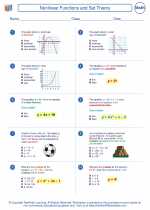 Nonlinear Functions and Set Theory
Nonlinear Functions and Set Theory  Worksheet/Answer key
Worksheet/Answer key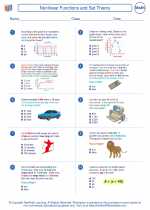 Nonlinear Functions and Set Theory
Nonlinear Functions and Set Theory  Worksheet/Answer key
Worksheet/Answer key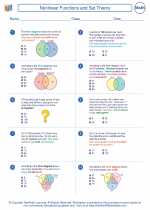 Nonlinear Functions and Set Theory
Nonlinear Functions and Set Theory  Worksheet/Answer key
Worksheet/Answer key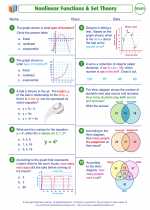 Nonlinear Functions and Set Theory
Nonlinear Functions and Set Theory  Worksheet/Answer key
Worksheet/Answer key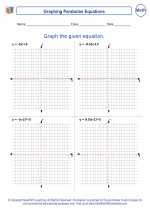 Parabolas
Parabolas 

 Worksheet/Answer key
Worksheet/Answer key
 Worksheet/Answer key
Worksheet/Answer key
 Worksheet/Answer key
Worksheet/Answer key
 Worksheet/Answer key
Worksheet/Answer key
 Worksheet/Answer key
Worksheet/Answer key

The resources above cover the following skills:
Algebra (NCTM)
Represent and analyze mathematical situations and structures using algebraic symbols.
Explore relationships between symbolic expressions and graphs of lines, paying particular attention to the meaning of intercept and slope.
Analyze change in various contexts.
Use graphs to analyze the nature of changes in quantities in linear relationships.